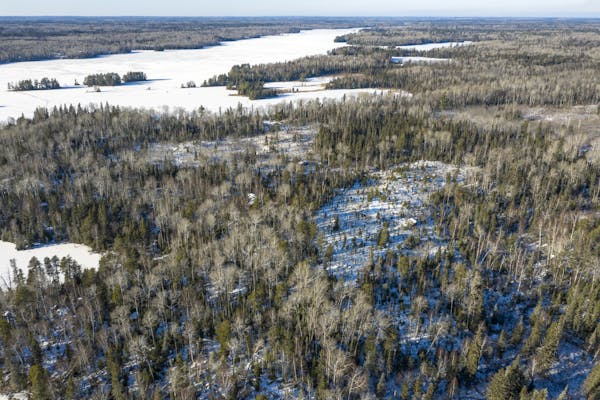Twin Metals will fight to keep alive several recently rejected permit applications for mining rights near the Boundary Waters Canoe Area Wilderness.
The company announced Wednesday that it will appeal the Bureau of Land Management's decision to reject all pending mineral lease rights and prospecting permit applications in a stretch of the Superior National Forest near the Boundary Waters.
The rejections were announced as the federal agency under the Biden administration restarts an environmental study on whether to impose a 20-year ban on copper mining in the area.
The decision to reject Twin Metals' applications was "politically motivated and completely unnecessary," Julie Padilla, Twin Metals chief regulatory officer, said in a statement. "This tells us that the federal government has no intention to listen to science, and it also makes clear that opponents of copper-nickel mining are afraid that the established environmental review process already underway for our project would show that a modern copper-nickel mine can be safe for the environment and should be permitted."
Twin Metals already holds two federal mineral leases, which were renewed under the Trump administration after the Obama administration canceled them. The recent application rejections, and potential moratorium on copper mining, would not affect those leases. However, their renewal and reinstatement remains in litigation and under review by the courts.
The company, owned by Chilean mining giant Antofagasta, vowed to move ahead with its planned $1.7 billion copper-nickel mine near Ely just outside the Boundary Waters.
"We have a viable mining project that we will move forward under existing law," said Kelly Osborne, Twin Metals chief executive.
The mine wouldn't just create jobs but would also produce the copper, nickel and cobalt needed for emerging clean-energy technologies to fight climate change, Osborne said.
Environmental groups have fought the mine proposal for years, saying it would irreparably harm the fragile wilderness with 1,500 square miles of lakes, streams, wetlands and forests.
It would be one of the state's first hardrock mines, and the company has been developing plans to open it on the shore of Birch Lake, just outside the Boundary Waters, by 2030.
The Bureau of Land Management said it was reacting to "broad concerns about potential impacts of mining on the wilderness area's watershed, fish and wildlife, Tribal trust and treaty rights, and the nearly $100 million annual local recreation economy."
The Twin Metals project is separate from the other proposed hardrock mine, the PolyMet copper-nickel mine farther south in Babbitt and Hoyt Lakes.
The PolyMet mine has also been tied up for years in a labyrinth of lawsuits.
In April, the Minnesota Supreme Court overturned PolyMet's permit to mine, sending the company's central permit back to state regulators for further review.
On Wednesday, an appellate court heard arguments on whether the Minnesota Pollution Control Agency adequately addressed pollution concerns raised by federal scientists when it gave the company a pollution discharge permit. The court of appeals will issue a ruling on the discharge permit within the next 90 days.
Greg Stanley • 612-673-4882
